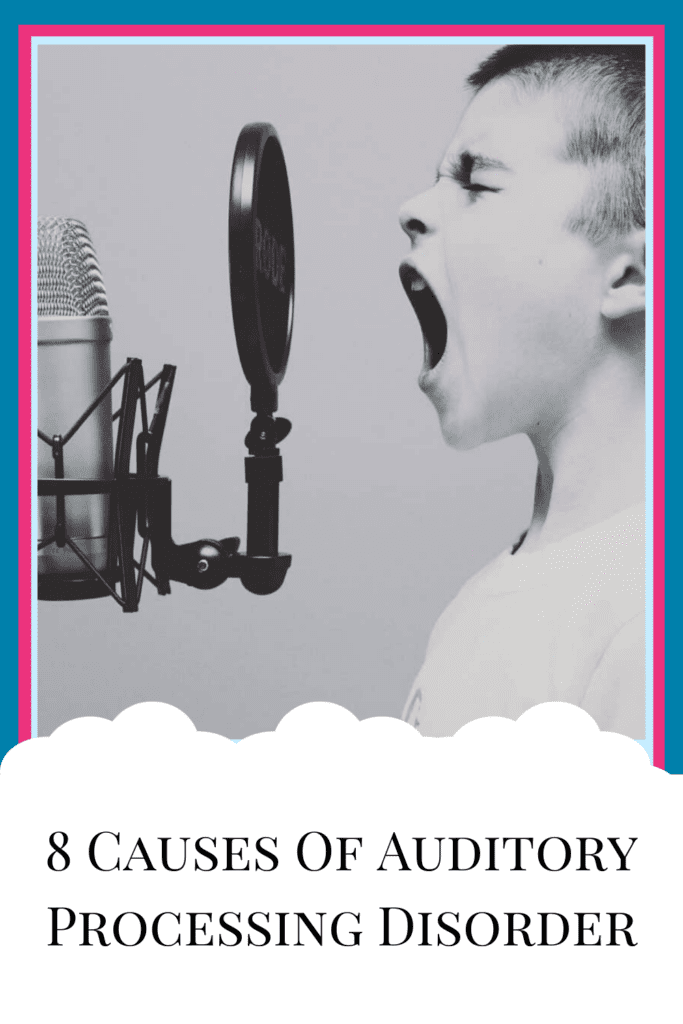Do you find yourself constantly wondering WHY? Why does your child struggle with reading and another child doesn’t?
Why don’t they listen or focus like other kids?
…Or maybe you wonder, ‘what’. What did I do wrong?
What about – Why did this happen when I felt like I did everything right?
I know I felt like that for years. Life felt so unfair and if I am being totally honest for many years I felt angry and bitter about the ‘why’.
What made me more upset was when I would ask, “what caused this?” – the answer was always the same.
“No one knows.”
Or, “It’s genetic.”
When it comes to learning and behaviour issues, parents are told this all the time – even when it comes to auditory processing issues.
Yet auditory processing issues more often develop in early to late infancy for various reasons.
1) Ear Infections
Children with dyslexia and learning disabilities were found to have higher incidences of ear infections. Ear infections can cause the cilia in the ear to become less sensitive or even damaged.
Initially researchers claimed there was no link between ear infections and language and learning. However, more recent research revealed that the functioning of the auditory cortex – which is in the brain – can become impaired as a result of ear infections.
The short-term hearing loss as a result of ear infections can compromise the auditory pathways from the ear to the brain and result in the brain poorly processing sound and information received via the ears.
Healing the cilia and exercising and strengthening the weak connections is required to improve auditory processing issues related to ear infections.
2) Brain Organization
Besides ear infections one of the biggest causes of poor auditory processing is underdevelopment of the left brain hemisphere which is where the auditory cortex is located. This can result because of poor connectivity between the left and right hemisphere as well as retained primitive reflexes.
Poor connectivity between the two brain hemispheres can result when children skip certain milestones like crawling, or do not do enough of these early movements which stimulate and develop both sides of the brain. This is becoming more common because our children are in baby carriers all the time – swings, saucers, strollers, slings, car seats etc.
3) Dairy allergy/sensitivity
Besides ear infections, sensitivities to foods can cause inflammation. An allergy or sensitivity to dairy is notorious for causing a build-up of mucus in the ears. These are the kids who often need to have tubes put in their ears to drain mucus when in fact removing dairy can in many cases avoid the need for the surgery at all.
The auditory processing problems can occur due to a build up of mucus which results in a child having a harder time distinguishing subtle sound differences. It can also impair the processing and the delivery of the correct message to the brain.
4) Insufficient Crawling
Crawling deserves its own category since it so crucial for both sides of the brain to work together. When children do not crawl, there will often be poor communication between both sides of the brain. Since the right side of the brain develops first, it can ‘over-develop’, resulting in it taking over and the left side being underdeveloped which is where the auditory cortex is.
90% of my clients failed to crawl, did not crawl for long or did not crawl ‘properly’ and instead did more of an awkward glide or ‘bum shuffle’. Crawling helps to integrate primitive reflexes from early infancy. The cross-lateral movement engages different parts f the brain simultaneously and ultimately helps to stimulate and develop the auditory system.
5) Yeast and Parasites
Parasites, bad bacteria in the gut, yeast or fungal overgrowth can cause impairments in the electrical signalling from the middle ear to the brain. Overgrowth of yeast and bad bacteria in the gut can occur for some of the following reasons:
- Antibiotics
- Mother has poor gut health since this is passed from mother to child via the birth canal
- Chlorine
- Excess carb and sugar consumption
- Mother was on hormonal contraception
- Mother has a history of antibiotic use
6) Deficiencies
Children with speech, reading and learning difficulties connected to poor auditory processing have shown in several studies to have moderate to severe deficiencies in certain key nutrients like essential fatty acids and vitamin A.
When these children were given supplements to address these deficiencies, they made significant gains with speech, reading, learning as well as focus and even hyperactivity. Essential fatty acids (think omega 3’s and DHA & EPA) are necessary for the good electrons to transfer auditory input.
7) Toxicity
The auditory nerve is particularly sensitive to toxicity from everything from heavy metals such as aluminum to even bilirubin toxicity which can result from weak liver function. Damage to the auditory nerve and structures involved need to first be addressed by identifying and removing the offending toxins and then healing the auditory structures and nerve.
8) Developmental Trauma
Premature birth, traumatic birth or head injuries can all contribute to poor auditory processing. However, even despite these offensives to the auditory system, with the correct nourishment, stimulation and exercises, auditory processing can be significantly improved so children are no longer limited by weak auditory processing.
I know that as a mom this information can feel overwhelming. You might even find yourself feeling guilty about what you think you should have or shouldn’t have done. Don’t. There are so many moms who did ‘everything right’. Instead of focusing again on things that can make you feel powerless, focus on what can bring change.
If you suspect that any of these factors could be holding your child back from breaking past their limits and reaching their full potential then join me for my free LIVE training November 21st at 10 EST. Sign up here.
In Health & Wholeness,
Lorraine


